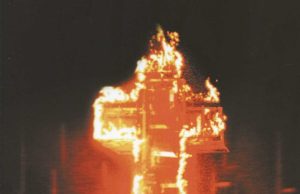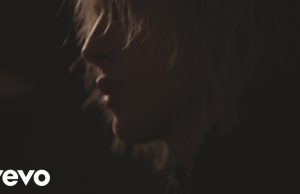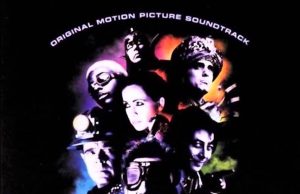 My day job is as a radio broadcaster, so my speaking voice is pretty decent — much better than my singing voice. But one thing I’ve never done on any of my own albums is a spoken-word bit.
My day job is as a radio broadcaster, so my speaking voice is pretty decent — much better than my singing voice. But one thing I’ve never done on any of my own albums is a spoken-word bit.
You remember those? They were tremendously popular in doo-wop and old country & western songs. I’m talking specifically about a mid-song, spoken-word interlude — by the same artist doing the lead vocal — which comes in place of a regular verse. The goal of these little interludes is to make a more intimate, genuine connection to the listener by revealing emotion that is better portrayed through spoken word than in song.
M’lady and I were cooking and folding laundry Sunday afternoon — spinning some mid-’70s Esther Phillips as the dogs chewed up the garden hose in the backyard. One of the songs, and I can’t remember which, sounded like it was destined to have a spoken-word section. It was begging for one. I announced my prediction that we were about to be treated to some spoken word. We laughed and were both shocked there wasn’t one, but that’s how I got thinking about all this.
The first song which comes to mind, with a perfect-example spoken-word section, is Elvis Presley’s Are You Lonesome Tonight?
“I wonder if you’re lonesome tonight
You know someone said that the world’s a stage and each of us must play a part
Fate had me playing in love with you as my sweetheart
Act one was where we met
I loved you at first glance
You read your lines so cleverly and never missed a cue
Then came act two, you seemed to change, you acted strange
And why I’ve never known
Honey, you lied when you said you loved me
And I had no cause to doubt you
But I’d rather go on hearing your lies
Than to go on living without you
Now the stage is bare and I’m standing there
With emptiness all around
And if you won’t come back to me
Then they can bring the curtain down.”
Specifically, I’m reminded of the tragic version on the awful Elvis In Concert album recorded and compiled from two shows in June 1977 (Omaha, Nebraska on the 19th and Rapid City, South Dakota on the 21st) and issued six weeks after Presley’s death in October of that year. It was also videotaped, and the resulting footage was also shown in October 1977. These concerts represent the sixth and fifth-last shows Elvis did before he died on Aug. 16th, 1977. His last show was Sunday, June 26 in Indianapolis, Indiana. The King was not in good form and sounded super-medicated during the famous spoken-word bit issued on the album. Even as a kid I wondered why it was released. It made me sad.
But even if he had nailed the part, it’s still epic cheese. I’m only a fan of this stuff from a kitsch perspective or in selected parodies, like Go Cry On Somebody Else’s Shoulder by The Mothers Of Invention.
Makes me wonder, are there any good ones? Let’s investigate. But first — some ground rules: Spoken word sections have to be by the lead vocalist and they have to be mid-song. So, that excludes things like Thriller by Michael Jackson — the spoken bit is mid-song, but was done by Vincent Price. It needs to be the vocalist, speaking directly to or about the subject of the song.
As I mentioned, the spoken word bit also can’t be an intro — ruling out things like I Know What I Like (In Your Wardrobe) by Genesis, Bitchin’ Camaro by Dead Milkmen, Spill The Wine by Eric Burdon & War, and Robbie Robertson’s Somewhere Down The Crazy River.
I’ll also disqualify spoken-word bits which are dialogue, rather than an address — so, stuff like the banter in Rag And Bone by The White Stripes or much of the speaking Roger Waters does on his 1984 solo album The Pros and Cons of Hitchhiking. Also excluded from consideration is stuff with spoken-word samples, like Brakes On by Air.
On to the ones which DO qualify, and checking to see if there’s any cool ones:
I do love Johnny Cash. I mean, who doesn’t? But gawd he’s got some terrible tripe in his catalog. Perhaps none more so than 1969’s The Holy Land (especially given the current violence there). The album is essentially a travelog of Johnny and June’s trip to Israel and at least half of the album is dialogue. There is this gem, however — The Ten Commandments with its authoritative reading of the actual text around three-quarters of the way through:
The Velvet Underground’s sophomore album White/Light White Heat has plenty of challenging songs, including the spoken-word story-song The Gift, which was written by Lou Reed and recited by John Cale. But that doesn’t count. However, one that certainly does count is Reed’s gorgeous doo-wop tribute I Found A Reason from 1970’s Loaded.
Lou’s solo career has a plethora of story-songs, and the one with a spoken-word but which comes to mind is the epic Street Hassle from 1978. Sadly, this doesn’t count because the spoken-bit was done by guest Bruce Springsteen. From the same era we find the zenith of cheese — Gene Simmons’ gross Christine Sixteen from 1977’s Love Gun.
“I don’t usually say things
Like this to girls your age
But when I saw you coming
Out of the school that day
That day I knew, I knew
I’ve got to have you, I’ve got to have you.”
No, Gene. Just no. He was 28 years old at the time. Fun fact — Eddie and Alex Van Halen play on Gene’s demo of the song.
Diana Ross’s version of Ain’t No Mountain High Enough from 1970 has a spoken-word section whereas the Marvin Gaye / Tammi Terrell original from 1967 does not.
Justin Bieber’s song All In It from 2015’s Purpose certainly is an earnest track, geez. The spoken-word bit reflects Justin’s then-newfound Christian rebirth:
“See, growing up I
I always felt like I had to be the best at everything
‘Cause I, I just didn’t think I wasn’t good enough.”
A palate cleanser is needed after that, so we’ll swish with some Weezer. Rivers Cuomo and co. had a hit with Beverley Hills in 2005. It’s not loaded with “singing” at all really, but it does have a mid-song spoken word section. And Hef was in the video!
That’s pretty cool, but nowhere near as cool as Hot Chocolate’s 1974 hit Brother Louie. The only problem is it doesn’t count because the original studio version features part of the spoken dialog by blues musician Alexis Korner. The song is about a mixed-race relationship which doesn’t pan out because both families of the two lovers refuse to support it. Screw it; even though it doesn’t count, it’s awesome:
It’s kinda racist now, though. Some people might consider Blue Öyster Cult’s Godzilla a little taboo as well, but I hear it as a loving tribute to Japanese monster movies. After all, the spoken-word bit in the song is done in Japanese by co-writer and lead vocalist Eric Bloom:
“Rinji news o moshiagemasu!
Gojira ga Ginza hoomen e mukatte imasu!
Daishikyu hinan shite kudasai!”
Baby, if you’ve ever wondered what that is in English —
“Attention, emergency news!
Godzilla is going toward the Ginza area!
Immediately escape, catch up, find shelter please!”
Bullet The Blue Sky by U2 meets the criteria for this. Bono does the spoken-word section in this Whole Lotta Love-flavoured banger from 1987’s The Joshua Tree. This is an example of a U2 song I actually like (there are probably five).
I’m not sure “Oh baby, just you shut your mouth — she says ‘Shhhhh’ ” warrants enough to be a spoken-word section. If it does, then David Bowie’s 1983 version of China Girl counts. Iggy Pop’s 1977 original has the line “Oh Jimmy, just you shut your mouth.”
Jimi Hendrix had a penchant for talking as well — not so much “sections” as couplets or asides. “Move over rover, and let Jimi take over” or “Here I come baby, coming to get ya.” James Brown also did a heck of a lot of talking, almost as much talking as singing at times.
The first Prince song I ever heard starts with a spoken-word bit. For that reason, Let’s Go Crazy is disqualified. But Clouds from 2014’s Art Official Age (his antepenultimate album) counts. So does the title track from 1981’s Controversy — for its inclusion of The Lord’s Prayer.
None of these recent examples can be described as cheesy. Let’s face it — we’re all looking for cheese. Look no further than the 1974 Dolly Parton masterpiece I Will Always Love You, which she wrote for the Kevin Costner in her life, Porter Wagoner. A river of warm, melted, sentimental cheese, flowing under a rhinestone footbridge where cute, cartoon animals paddle discarded wigs like little boats:
“I hope life, will treat you kind
And I hope that you have all
That you ever dreamed of
Oh I do wish you joy
And I wish you happiness
But above all this
I wish you love.”
I hate The Barenaked Ladies and I hate If I Had A Million Dollars. But it counts. Let’s never speak of it again.
Back to the classics, Deep Purple have one of these songs in their more recent catalog — 2020’s Whoosh! The song is Man Alive and features a spoken-word section by vocalist Ian Gillan, and over-the-top production by Bob Ezrin. Perhaps not their greatest album, but I’ll tread carefully here. I once did a Classic Album Review of Come Taste The Band and fans were downright furious with me. So, I’ll just sidestep over to another rock powerhouse — one at the top of their game. Van Halen’s fourth album Fair Warning (1981) opens with a monster song, Mean Street. It also has some classic David Lee Roth pulling out all the Diamond Dave stops, including a spoken-word bit:
“See, a gun is real easy in this desperate part of town,
Turns you from hunted into hunter, yeah
You go an’ hunt somebody down,
Wait a minute, ah, somebody said fair warning,
Lord, Lord, strike that poor boy down.”
There are loads and loads more, but I’ll end here with what I’ve decided is the greatest song with an impassioned spoken-word bit, hands-down. We’re talking about Spinal Tap’s Stonehenge from 1975’s The Sun Never Sweats. Yeah, it has an opening spoken-word bit, but it also has a middle one. Besides, it’s the best production value they’ve ever had on stage.
“And oh how they danced
The little children of Stonehenge
Beneath the haunted moon
For fear that daybreak might come too soon.”
• • •
Area Resident is an Ottawa-based journalist, recording artist, music collector and re-seller. Hear (and buy) his music on Bandcamp, email him HERE, follow him on Instagram and check him out on Discogs.










































